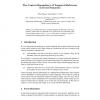137
Voted
CONTEXT
1999
Springer
15 years 7 months ago
1999
Springer
AI and psychological approaches to context are contrasted and the dynamic and automatic nature of the continuous context change in human cognition is emphasized. A dynamic theory o...
128
click to vote
CONTEXT
1999
Springer
15 years 7 months ago
1999
Springer
Abstract. Temporal reference in natural language is inherently context dependent: what counts as a moment in one context may be structurally analysed in another context, and vice v...
92
Voted
PADS
1999
ACM
15 years 7 months ago
1999
ACM
109
Voted
PADS
1999
ACM
15 years 7 months ago
1999
ACM
This paper introduces the Critical Channel Traversing (CCTJ algorithm, a new scheduling algorithm for both sequential and parallel discrete event simulation. CCT is a general cons...
90
Voted
PADS
1999
ACM
15 years 7 months ago
1999
ACM
This year’s installment of the PADS “community assessment” looks at previous assessments and considers some current directions in distributed simulation and their possible r...
103
Voted
PADS
1999
ACM
15 years 7 months ago
1999
ACM
113
Voted
PADS
1999
ACM
15 years 7 months ago
1999
ACM
Most work to date in parallel and distributed discrete event simulation is based on assigning precise time stamps to events, and time stamp order event processing. An alternative ...
132
Voted
PADS
1999
ACM
15 years 7 months ago
1999
ACM
In an attempt to cope with time-varying workload, traditional adaptive Time Warp protocols are designed to react in response to performance changes by altering control parameter c...
99
Voted
PADS
1999
ACM
15 years 7 months ago
1999
ACM
165
Voted
PADS
1999
ACM
15 years 7 months ago
1999
ACM
We have developed a set of performance prediction tools which help to estimate the achievable speedups from parallelizing a sequential simulation. The tools focus on two important...

